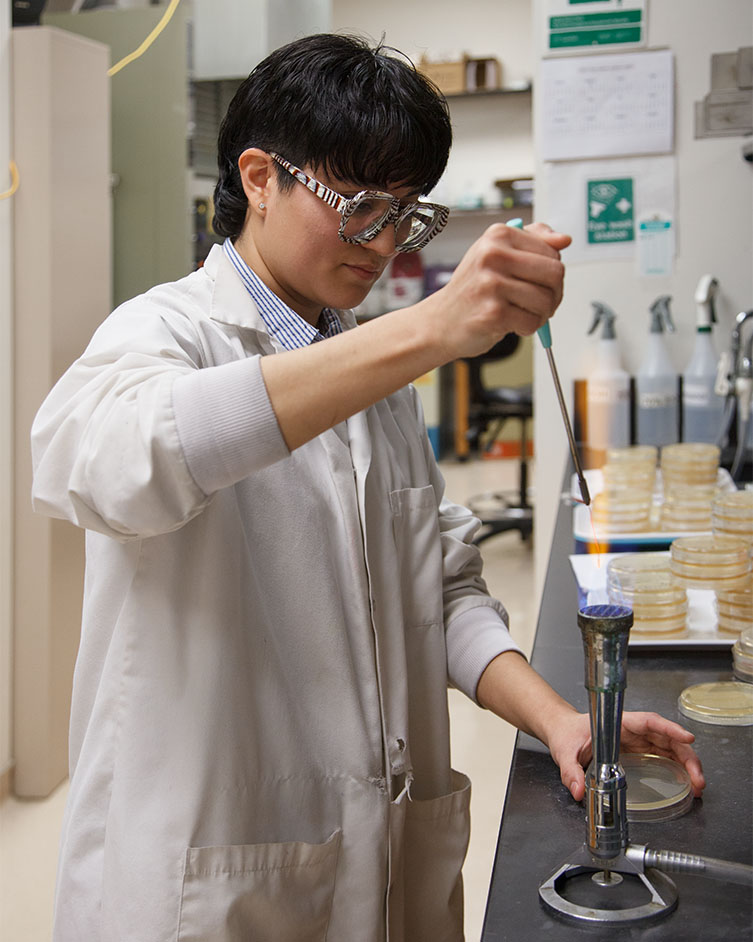Zarazúa-Osorio Earns A.P. Kimball Graduate Fellowship for Research
Brenda Zarazúa-Osorio is taking a closer look at the mechanisms of cell differentiation and how cells survive under nutrient starvation.

Zarazúa-Osorio, pursuing her Ph.D. in biology from the College of Natural Sciences and Mathematics at the University of Houston, has earned the A.P. Kimball Graduate Fellowship for her research.
The fellowship, valued at $5,000, is awarded each year to a Ph.D. student in the Department of Biology and Biochemistry who shows research potential and excellence based on publications and presentations of their work.
Zarazúa-Osorio’s work has been featured in the American Society for Microbiology’s mSystems Journal and mBio Journal.
Cell Differentiation and Diseases
Assisted by professor Masaya Fujita, Zarazúa-Osorio’s study uses Bacillus subtilis, a simple organism, to understand the mechanisms of cell differentiation in multicellular organisms such as humans.
“Cell differentiation is essential for development, growth, reproduction and longevity in humans,” said Zarazúa-Osorio. “The failure of cell differentiation plays an important role in diseases such as cancer.”
Bacillus subtilis, which is unicellular, simple and thrives in soil, is highly adaptive to change in its surrounding environment. When starvation occurs, it differentiates into specific cell types which result in the formation of biofilms and spores.
“When starvation is prolonged, the Bacillus subtilis cells form biofilm and spores, which are tolerant of outside stresses such as starvation, high temperatures and radiation,” said Zarazúa-Osorio.
Bacillus subtilis, which is also used commercially in flavor enhancers, sweeteners, household detergents, antibiotics, vitamins and the development of vaccines, may soon help in the development of better disease treatment for patients.
“By understanding the underlying mechanisms of cell differentiation, we may eventually uncover novel strategies to improve the clinical outcome of patients with various diseases caused by the failure of cell differentiation,” said Fujita.
Cell Growth, Starvation and Cell Signaling
For decades, the widely accepted model has pointed to an unknown factor produced under starvation that acts as a trigger to stimulate the signaling pathway for biofilm and spore formation.
“Therefore, finding the trigger factor controlling cell differentiation, in this case biofilm and spore formation, is essential to understanding the mechanisms,” said Zarazúa-Osorio.
Through her research, Zarazúa-Osorio found that, instead of the “starvation factor” mechanism, slowing down cell growth under starvation is a key trigger to activate cell signaling processes that lead to biofilm and spore formation.
Since 2009, Fujita and his team have proposed an alternative model, the threshold model, in which no starvation signaling factor is involved in triggering cell differentiation.
“Brenda’s recent results are significant because her data further support our proposed model and may revise the longstanding widely accepted model,” said Fujita.
A Natural Fit at UH
Zarazúa-Osorio, from Houston, attended Whitman College in Walla Walla, Washington, for her undergraduate studies. She returned to Houston to pursue graduate studies at UH after becoming interested in Fujita’s research.
“I found Dr. Fujita through a Google search, and his research was enough to persuade me to come home to Houston to pursue a Ph.D.,” said Zarazúa-Osorio.
After volunteering in a few of his labs, she knew UH was where she wanted to pursue her Ph.D.
Zarazúa-Osorio is preparing additional publications about her work and is expected to complete her Ph.D. in the fall.
- Chris Guillory, College of Natural Sciences and Mathematics